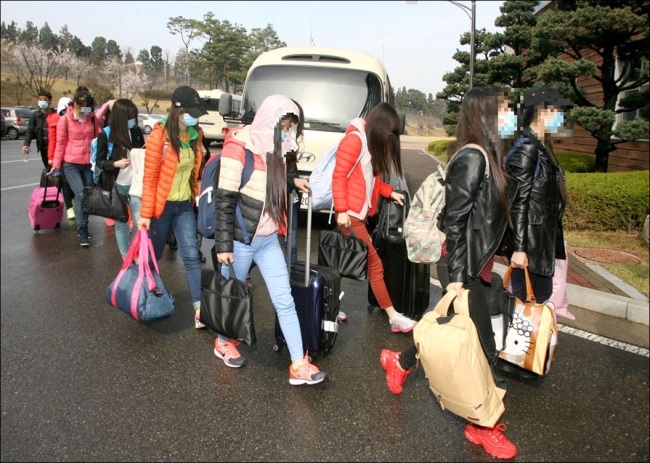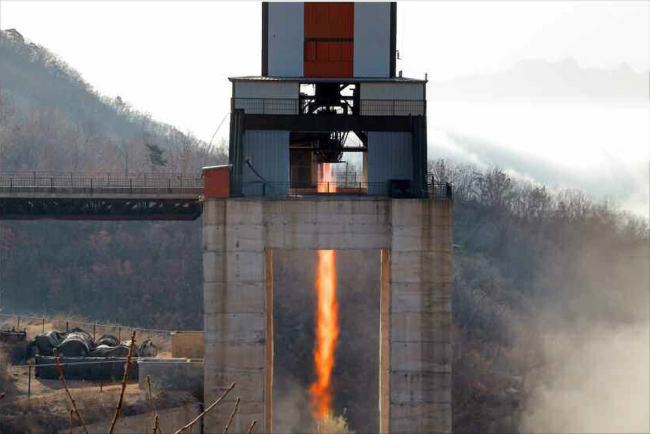In the wake of last week’s mass defection, additional exoduses may come about among North Koreans working overseas as the impact of U.N. resolutions and unilateral sanctions takes shape, top Seoul officials said Sunday.
A group of a male manager in his 30s and 12 female employees in their early 20s who had served at a North Korean restaurant arrived in Seoul on Thursday, the Unification Ministry announced late Friday. Officials declined to unveil the detailed time line of their journey or the location of the diner, citing diplomatic sensitivity, but they were believed to have departed from China on Wednesday or Thursday and flown via a Southeast Asian nation.
 |
This image shows the 13 North Koreans who defected to the South last week after having worked at a restaurant outside their homeland. (Unification Ministry) |
Contrary to earlier news reports, the 13 were “a sizable portion” of the restaurant’s staff, but “not everyone,” a senior ministry official said, indicating that some others left there may be hoping to follow suit -- or already be on their way here.
“There are some remaining people who could not come. ... Circumstantially they would seek to, but their precise whereabouts right now cannot be verified, in addition to safety concerns,” the official told reporters on customary condition of anonymity.
The rare case reflects the budding effects of global pressure and South Korea’s recent appeal to its citizens to refrain from using any profit-making North Korean facilities abroad, which it has labeled as cash-generating tools for the Kim Jong-un regime, officials said.
According to the ministry, one female server said during questioning, “I’ve come to escape to Seoul where there is hope, as sanctions intensified recently and I lost hope for the North Korean system.” Another defector also said, “I’d developed a desire to live as a South Korean after gaining knowledge about South Korea’s democracy while watching TV shows and dramas overseas.”
“Pyongyang’s demands for foreign currency despite strengthening sanctions, their overseas lives with relatively easier access to outside information, especially our broadcasts and the Internet that portray freedom and South Korean culture, and the factors alike, have apparently come together to compel them to defect, with the recent sanctions and consequent difficulties providing a more direct (motive),” the official said.
Signs are growing that the sanctions have already started to hold sway, they said. All six flag-on-convenience ships blacklisted by the latest U.N. Security Council resolution have been deregistered from the International Maritime Organization, while the remaining 21 North Korean flag boats have returned home and remain grounded there since being denied entry to China, Russia, Hong Kong and other ports, vessel tracking websites show.
About half of the approximately 130 North Korean restaurants, which would collectively deposit around $10 million a year in state coffers, are believed to be struggling to meet their quota, some resorting to illicit sex services and supplementary food sales to court more customers and boost revenues, the ministry official noted.
More companies in China and elsewhere are seen shying away from dealing with their North Korean counterparts. In some regions bordering with China, the prices of rice and other staples have increased over the last month, he added, quoting intelligence sources.
Given Seoul’s longstanding low-profile approach to the issue of bringing in defectors from a third country, the ministry’s unusual impromptu announcement sparked speculation over a potential policy shift toward a more open, proactive one.
But another senior official at the Foreign Ministry reaffirmed the existing strategy, though he raised the need to reinforce collaboration with other countries such as China and those in Southeast Asia for future mass exoduses.
“The government has decided to unwrap the latest case due to its rarity and implications on recent sanctions. Our stance toward quiet cooperation remains unchanged,” he said at a separate meeting with reporters.
“We have made our position clear to relevant countries that the defectors must come to South Korea according to their free will, and not be repatriated to the North against their will. But there is a need for stronger cooperation with those countries, as we can’t rule out the possibility for further group defections as the sanctions and pressure drive kicks into high gear.”
 |
This photo carried Saturday by North Korea`s Rodong Sinmun appears to have been taken during what state media claimed was a test of a new engine for an intercontinental ballistic missile. (Yonhap) |
He also warned against an additional military provocation by Pyongyang, referring to the recent string of Kim’s threats to test more nuclear warheads and intercontinental ballistic miss
On Saturday, state media claimed the young ruler has supervised an experiment of a new higher-power engine for an intercontinental ballistic missile capable of striking the U.S. mainland at the Sohae station in the western town of Dongchang.
“As expressed through our recent summits with the U.S., China and Japan, the North would face evens greater sanctions pressure should it stage another provocation. There is consensus in particular between Seoul, Washington and Tokyo for stronger sanctions,” the diplomat added.
By Shin Hyon-hee (
heeshin@heraldcorp.com)









